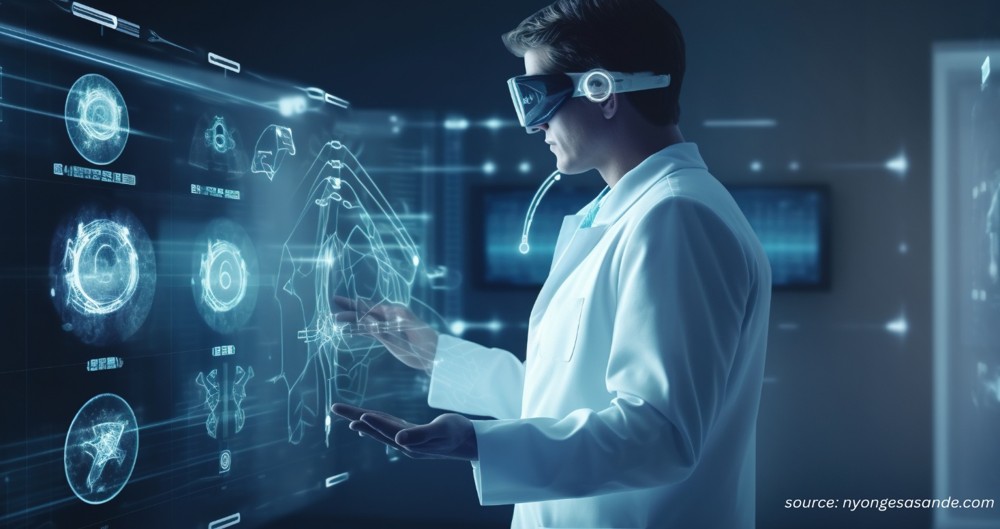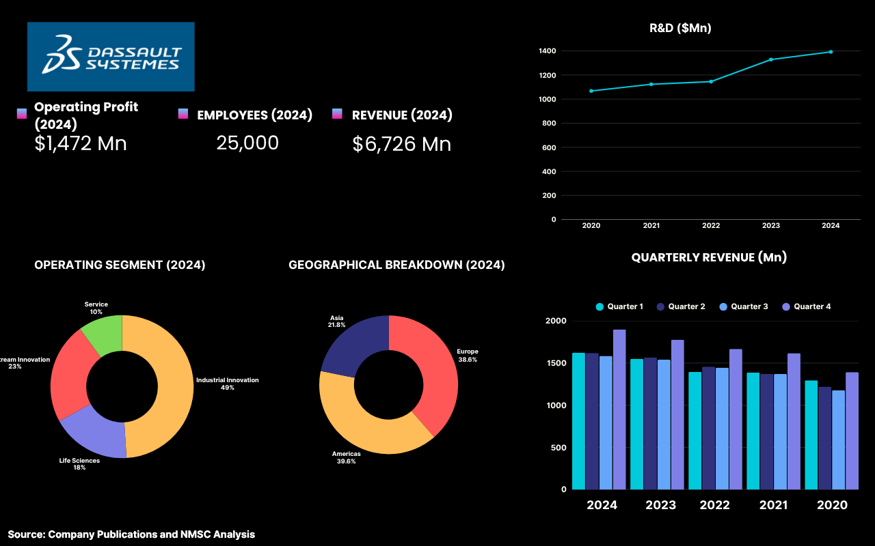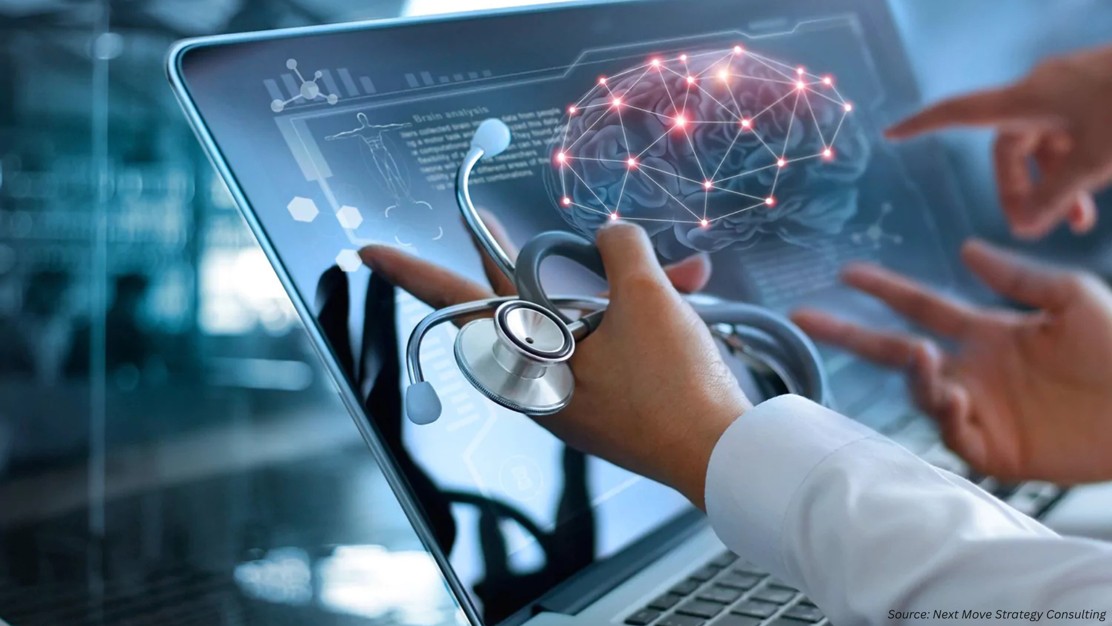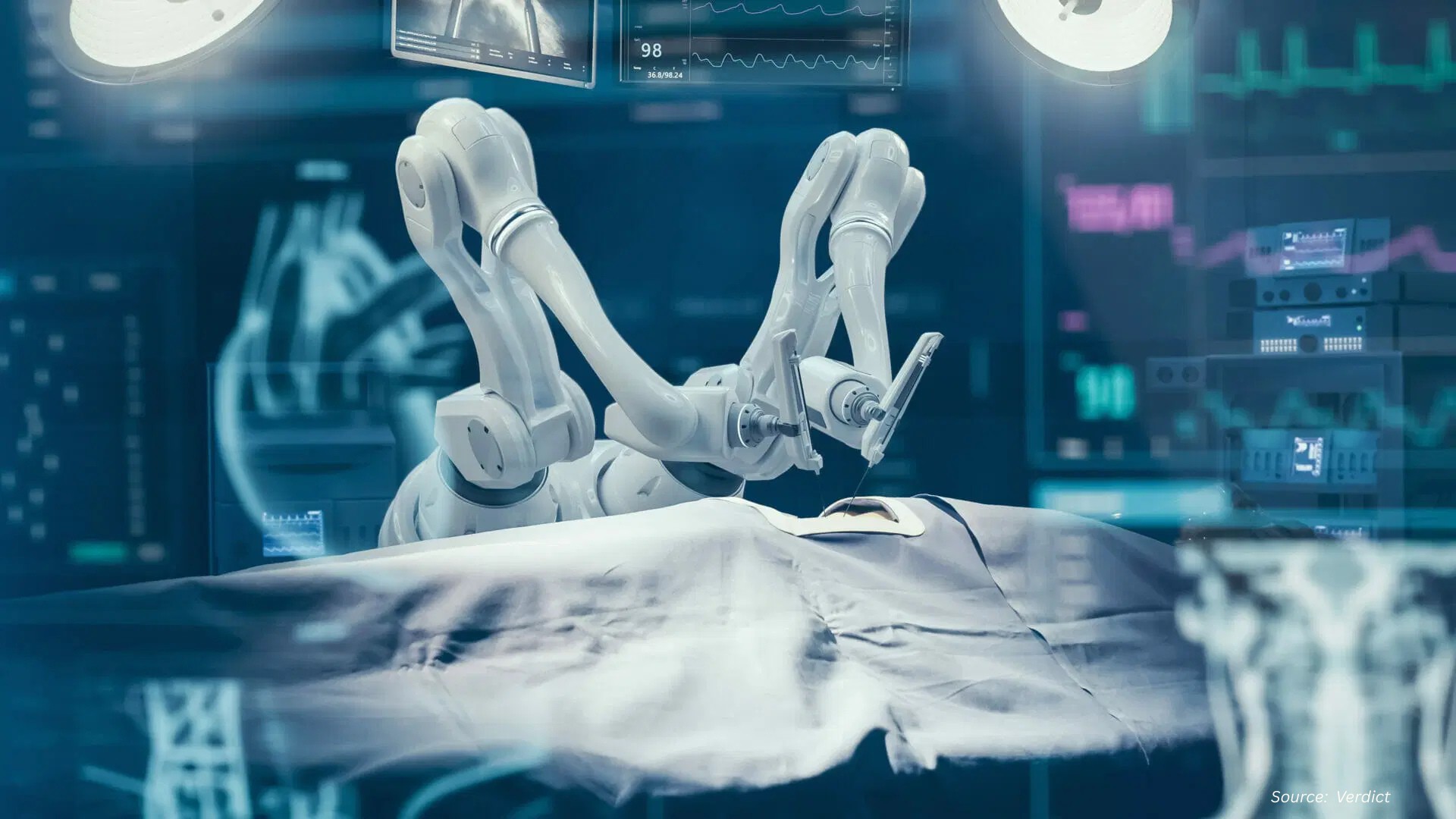AI in Healthcare: How Leading Companies Drive the Next Wave of Innovation
Published: 2025-11-17

As per the NMSC analysis, the Digital Twin in Healthcare Market is set to maintain strong growth momentum, with the market size expected to reach around USD 4.69 billion by 2030, marking a solid CAGR of 24.35%. Valued at USD 1.16 billion in 2024, the sector is projected to rise to USD 1.57 billion by 2025.
Curious about the Digital Twin in Healthcare Market? Grab a FREE Sample Now
The market is undergoing a remarkable transformation, driven by the rapid digitalization of healthcare systems and the integration of cutting-edge technologies such as AI, IoT, and data analytics. Initially adopted for applications in medical device manufacturing and hospital asset management, digital twin solutions are now being implemented across a broad spectrum of healthcare domains, including patient monitoring, personalized medicine, clinical research, and hospital operations.
The rising focus on precision care, real-time health insights, and predictive modeling is encouraging healthcare providers and technology companies to invest in intelligent, interoperable digital twin platforms. Both global and regional players are introducing advanced, scalable solutions designed to simulate human physiology, optimize workflows, and enhance decision-making. This technological evolution is reshaping the way care is delivered, improving patient outcomes, and accelerating innovation, positioning digital twin technology as a cornerstone of next-generation healthcare ecosystems.
Industry Overview
The digital twin in healthcare market trends is being reshaped by many of the same forces driving digital transformation across industries: as healthcare systems move toward smarter, data-driven, and patient-centric models, digital twins are evolving beyond their initial applications in equipment modeling and hospital asset management into intelligent, adaptive platforms that simulate complex biological systems and healthcare environments.
Modern digital twin solutions are increasingly integrated with AI, IoT-enabled medical devices, and advanced analytics to enable real-time patient monitoring, predictive diagnostics, personalized treatment planning, and operational optimization. The growing push toward connected care ecosystems and precision medicine is driving the convergence of clinical data, IT infrastructure, and digital modeling technologies, allowing healthcare providers to achieve unprecedented visibility, predictive capabilities, and interoperability across clinical and operational functions.
At the same time, the adoption of digital twins is accelerating research and innovation, helping to model disease progression, test therapies virtually, and improve medical device design. Furthermore, the global market share is witnessing rising demand for modular, customizable, and domain-specific digital twin solutions across segments such as hospitals, pharmaceutical research, diagnostics, and patient care.
As healthcare delivery becomes more complex and interconnected, organizations are seeking platforms that can seamlessly integrate with electronic health records (EHRs), cloud infrastructures, and evolving regulatory frameworks. This need for interoperability and scalability is driving innovation in flexible architectures that support both patient-specific and population-level modelling.
Simultaneously, health systems are prioritizing operational efficiency, patient safety, and outcome optimization through energy-efficient hospital operations, AI-driven decision support, and continuous virtual simulations that reduce costs and enhance care quality. With the rise of telemedicine, value-based care, and workforce challenges, digital twin technologies are emerging as essential enablers of intelligent, adaptive, and future-ready healthcare strategies, cementing their role at the core of the digital twin in healthcare market transformation.
Several major companies are driving the growth and innovation of the digital twin in healthcare industry, including Siemens Healthineers AG, GE HealthCare Technologies, Inc., Dassault Systèmes SE, Koninklijke Philips N.V., ANSYS, Inc., Microsoft Corporation, IBM Corporation, NVIDIA Corporation, PTC Ltd., Unlearn.AI, Amazon Web Services, Inc. (AWS), SAP SE, Oracle Corporation, Atos SE, and Medtronic Plc.
These leaders are pioneering the integration of AI, cloud computing, advanced simulation, and real-time analytics to develop intelligent digital twin platforms that enhance patient care, clinical decision-making, and operational efficiency. Their technologies enable the creation of virtual replicas of patients, medical devices, and healthcare systems, supporting predictive diagnostics, personalized treatments, and optimized workflows.
By forming strategic partnerships with healthcare providers, research institutions, and regulators, these companies are driving interoperability, scalability, and compliance across diverse healthcare settings. Additionally, their investments in high-performance computing, data security, and AI-driven modeling are positioning digital twins as a core enabler of precision medicine, accelerated research, and next-generation healthcare delivery, shaping a smarter and more connected global healthcare ecosystem.
Highlights of Microsoft Corporation.
Microsoft Corporation, headquartered in Redmond, Washington, is a global technology leader specializing in software, cloud computing, and artificial intelligence. The company is a significant player in the digital twin in healthcare market share, leveraging its Azure Digital Twins platform to create virtual models of physical environments, including healthcare settings. This technology enables real-time monitoring and simulation of patient data, facilitating personalized medicine, predictive analytics, and optimized healthcare operations. Microsoft's advancements in digital twin technologies are pivotal in transforming healthcare delivery and improving patient outcomes.
In 2024, Microsoft partnered with Providence, a leading healthcare provider, to accelerate AI-driven solutions in the healthcare sector, leveraging Microsoft Cloud for Healthcare and Azure as a unified platform. This collaboration enhances interoperability, generates actionable clinical insights, and supports more efficient care delivery, directly contributing to the growth of the market.
In May 2025, Microsoft also launched the Digital Twin Builder within its Microsoft Fabric platform, enabling healthcare organizations to design, manage, and visualize digital twins at scale. These developments strengthen Microsoft’s position in the digital twin in healthcare market, reinforcing its role in advancing patient-centric, data-driven healthcare solutions.
Highlights of Siemens Healthineers
Siemens Healthineers, headquartered in Erlangen, Germany, is a leading global medical technology company specializing in diagnostic imaging, laboratory diagnostics, point-of-care testing, and digital health solutions. The company is actively engaged in the market, developing advanced technologies such as the "Digital Twin of the Heart," which creates personalized, virtual models of patients' organs to simulate physiological processes.
This approach enables clinicians to visualize responses to treatments before interventions, enhancing precision and outcomes in patient care. Siemens Healthineers' integration of digital twin technologies underscores its commitment to advancing personalized medicine and improving healthcare delivery.
Holding a 13.9% share of the global industry, Siemens Healthineers is a major driver of innovation and adoption in this sector. By providing advanced digital twin solutions that simulate patient physiology and clinical workflows, the company is enabling healthcare providers to enhance operational efficiency, optimize treatment strategies, and improve patient outcomes. Its strong market presence allows it to set industry standards for scalability, interoperability, and precision in digital twin applications, solidifying its role as a key influencer shaping the growth and transformation of the healthcare digital twin ecosystem.
Highlights of Ge Healthcare.
GE HealthCare, headquartered in Chicago, Illinois, is a global leader in medical technology, specializing in imaging, diagnostics, and digital health solutions. The company plays a significant role in the market by developing advanced technologies that create virtual models of patients, medical devices, and healthcare systems.
These digital twins enable real-time monitoring, predictive analytics, and personalized treatment planning, enhancing patient outcomes and operational efficiency. By integrating AI and cloud-based analytics with clinical workflows, GE HealthCare leverages the digital twin in healthcare market to drive innovation and transform care delivery worldwide.
In April 2025, Children’s Mercy Kansas City enhanced patient access and care delivery through its Patient Progression Hub, powered by GE HealthCare’s Command Center and Digital Twin technology. This initiative demonstrates GE HealthCare’s ability to apply digital twin solutions in real-world hospital settings, optimizing patient flow, reducing wait times, and improving clinical decision-making. The successful implementation strengthens GE HealthCare’s position in the digital twin in healthcare market, showcasing its expertise in creating scalable, data-driven solutions that advance operational efficiency and patient-centered care.
Highlights of Dassault Systems
Dassault Systèmes, headquartered in Vélizy-Villacoublay, France, is a global leader in 3D design, digital modeling, and simulation software. The company specializes in providing solutions that enable businesses to create digital twins virtual representations of physical entities for various industries, including healthcare.
In the digital twin in healthcare market, Dassault Systèmes offers platforms like Meditwin and 3DEXPERIENCE, which facilitate the development of personalized virtual models of patients and medical systems. These technologies support real-time monitoring, predictive analytics, and personalized treatment planning, thereby enhancing patient outcomes and operational efficiency.
In 2025, Dassault Systèmes unveiled its AI-powered virtual twin technologies at CES 2025, highlighting a range of innovations specifically designed to advance the digital twin in healthcare market. These developments emphasize the company’s focus on combining artificial intelligence with digital twin solutions to create highly accurate, personalized virtual models of patients, medical devices, and healthcare processes.
By enabling real-time simulation, predictive analytics, and optimized clinical workflows, these technologies support improved patient outcomes, operational efficiency, and precision medicine. This strategic focus reinforces Dassault Systèmes’ position as a leading innovator in the rapidly growing digital twin in healthcare market.
Highlights of Unlearn.ai Inc
Unlearn.AI, headquartered in San Francisco, California, is a pioneering artificial intelligence company specializing in the development of digital twins for clinical trials. By leveraging AI to create virtual models of patients, Unlearn. AI enables the simulation of clinical trial outcomes, allowing for more efficient and ethical drug development processes.
This approach significantly reduces the need for extensive control groups, accelerates trial timelines, and enhances the precision of clinical research. The company's innovations are central to the evolving digital twin in healthcare market, which is transforming how medical research is conducted and how patient data is utilized.
In 2024, Unlearn.AI significantly expanded its operations by relocating to a larger office space in San Francisco's SoMa district, quadrupling its previous capacity to support its growing team and development activities. This expansion followed a successful USD 50 million funding round, reflecting strong investor confidence in the company’s innovative approach.
The increased capacity directly supports Unlearn.AI’s advancement of AI-generated digital twins, which are transforming clinical trials by enabling virtual patient modeling, accelerating drug development, and improving trial efficiency. These strategic developments strengthen Unlearn.AI’s influence and growth potential within the rapidly evolving digital twin in healthcare market.
Summary of Digital Twin In Healthcare Market
The digital twin in healthcare market is witnessing rapid growth as healthcare systems increasingly adopt advanced digital technologies to improve patient outcomes, optimize clinical workflows, and enhance operational efficiency. Digital twin technology creates virtual replicas of patients, medical devices, and healthcare processes, allowing real-time monitoring, predictive analytics, and simulation of treatment responses.
This innovation supports personalized medicine, reduces risks in clinical decision-making, and enables more efficient resource utilization. Integration with AI, cloud computing, and IoT further strengthens the market by enabling data-driven insights and more accurate modeling of complex biological and operational systems.
Global leaders in the digital twin in healthcare market, including Siemens Healthineers, GE HealthCare, Dassault Systèmes, Microsoft, and Unlearn.AI, are driving this transformation by integrating AI, predictive analytics, cloud computing, IoT-enabled medical devices, and data security into their digital twin solutions. Industry applications, such as GE HealthCare’s Patient Progression Hub at Children’s Mercy Kansas City and Siemens Healthineers’ Digital Twin of the Heart, demonstrate the tangible impact of these technologies on patient care, clinical decision-making, and operational efficiency. Rising demand for personalized medicine, virtual clinical trials, and optimized healthcare workflows is further shaping the market, positioning digital twin solutions as critical enablers of a smarter, more connected, and data-driven healthcare ecosystem.
About the Author
 Bidhudhyoti Nag is a seasoned researcher with over two years of experience, specializing in various industry verticals such as the travel accommodation market, HVAC market and construction electronics. With a strong passion for writing, she views blogging as a valuable platform to share her industry insights and expertise. Outside of tracking market trends and developments, Bidhudhyoti is interested in sports, travelling, and exploring new experiences.
Bidhudhyoti Nag is a seasoned researcher with over two years of experience, specializing in various industry verticals such as the travel accommodation market, HVAC market and construction electronics. With a strong passion for writing, she views blogging as a valuable platform to share her industry insights and expertise. Outside of tracking market trends and developments, Bidhudhyoti is interested in sports, travelling, and exploring new experiences.
About the Reviewer
 Supradip Baul is an accomplished business consultant and strategist with over a decade of rich experience in market intelligence, strategy, technology and business transformation. His work has included rigorous qualitative and quantitative analysis across multiple industries, helping clients shape investment decisions and long-term roadmaps. Earlier in his career, he was associated with Gartner, where he contributed to industry-leading reports and market share analyses. He has worked with leading global companies and holds an MBA with a dual specialization in Marketing and Finance.
Supradip Baul is an accomplished business consultant and strategist with over a decade of rich experience in market intelligence, strategy, technology and business transformation. His work has included rigorous qualitative and quantitative analysis across multiple industries, helping clients shape investment decisions and long-term roadmaps. Earlier in his career, he was associated with Gartner, where he contributed to industry-leading reports and market share analyses. He has worked with leading global companies and holds an MBA with a dual specialization in Marketing and Finance.





















Add Comment